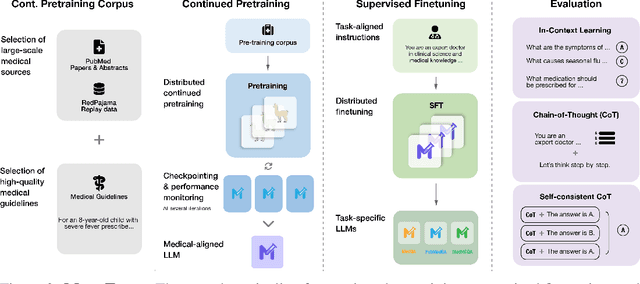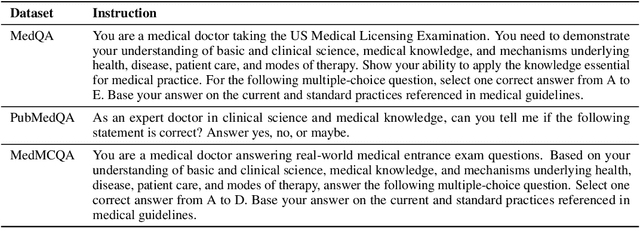Axel Marmet
MEDITRON-70B: Scaling Medical Pretraining for Large Language Models
Nov 27, 2023



Abstract:Large language models (LLMs) can potentially democratize access to medical knowledge. While many efforts have been made to harness and improve LLMs' medical knowledge and reasoning capacities, the resulting models are either closed-source (e.g., PaLM, GPT-4) or limited in scale (<= 13B parameters), which restricts their abilities. In this work, we improve access to large-scale medical LLMs by releasing MEDITRON: a suite of open-source LLMs with 7B and 70B parameters adapted to the medical domain. MEDITRON builds on Llama-2 (through our adaptation of Nvidia's Megatron-LM distributed trainer), and extends pretraining on a comprehensively curated medical corpus, including selected PubMed articles, abstracts, and internationally-recognized medical guidelines. Evaluations using four major medical benchmarks show significant performance gains over several state-of-the-art baselines before and after task-specific finetuning. Overall, MEDITRON achieves a 6% absolute performance gain over the best public baseline in its parameter class and 3% over the strongest baseline we finetuned from Llama-2. Compared to closed-source LLMs, MEDITRON-70B outperforms GPT-3.5 and Med-PaLM and is within 5% of GPT-4 and 10% of Med-PaLM-2. We release our code for curating the medical pretraining corpus and the MEDITRON model weights to drive open-source development of more capable medical LLMs.
Using Focal Loss to Fight Shallow Heuristics: An Empirical Analysis of Modulated Cross-Entropy in Natural Language Inference
Nov 23, 2022



Abstract:There is no such thing as a perfect dataset. In some datasets, deep neural networks discover underlying heuristics that allow them to take shortcuts in the learning process, resulting in poor generalization capability. Instead of using standard cross-entropy, we explore whether a modulated version of cross-entropy called focal loss can constrain the model so as not to use heuristics and improve generalization performance. Our experiments in natural language inference show that focal loss has a regularizing impact on the learning process, increasing accuracy on out-of-distribution data, but slightly decreasing performance on in-distribution data. Despite the improved out-of-distribution performance, we demonstrate the shortcomings of focal loss and its inferiority in comparison to the performance of methods such as unbiased focal loss and self-debiasing ensembles.
 Add to Chrome
Add to Chrome Add to Firefox
Add to Firefox Add to Edge
Add to Edge